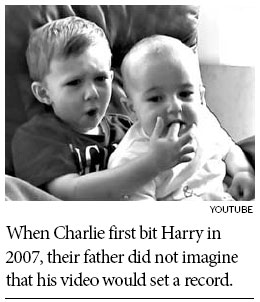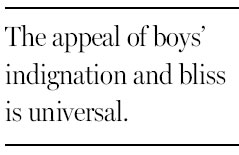Still chomping after 417.6 million hits
Updated: 2012-03-04 07:49
By Sarah Lyall (The New York Times)
|
|||||||||||
|
Balancing unexpected fame with a quiet life. Charlie, Howard and Harry Davies-Carr at home. [Andrew Testa for The New York Times] |
MAIDENHEAD, England - Visiting the local park not long ago, Shelley Davies-Carr and her four sons were suddenly surrounded by a gaggle of overexcited teenagers. "Oh, my God!" they shrieked, as only teenagers can. "'Charlie Bit My Finger!'"
Indeed, it is hard to find anyone in the video-watching world who has not heard of "Charlie Bit My Finger," a YouTube video featuring tiny Charlie Davies-Carr chomping on his older brother, Harry. Since it was posted in 2007, the 56-second clip of English-accented toddler indignation and infant bliss has been viewed a mind-boggling 417.6 million times, making it the most successful noncommercial video in YouTube history.
Its appeal is simple. "I have watched this at least 100 times," a viewer named Hannahjp100 declared on the "Charlie" site, "and I still laugh while watching it."

Howard Davies-Carr, a 43-year-old information technology consultant who is the father of Charlie, now 5, and Harry, 7, said that though he did not regard his sons as celebrities, they had become a brand, like it or not. He and Shelley, who runs a nursery school at home, explained some of the repercussions. (They live not far from Maidenhead, but do not want the town's name made public.)
The family gets recognized in random places. There are fan sites, Facebook pages and endless parody videos.
Mr. Davies-Carr will not say exactly how much money they have made, only that it is "in excess of 100,000 pounds," or more than $158,000, and enough to pay for the boys' education.
Why this particular video?
"Videos are videos. They're either popular or they're not," said Mr. Davies-Carr, who originally uploaded the video for a friend in Colorado. The viral part came later, unexpectedly, he said, when the video was apparently picked up by a college humor site and somehow things took off.
In Britain, some commentators have struggled to fathom the appeal of the video and sequels showing the boys and their brothers, Jasper, 3 1/2, and Rupert, 8 months, engaging in nonbiting activities. "They are not, to put it politely, exceptional," wrote Terence Blacker in The Independent.
That is not how the world sees it, and Mr. Davies-Carr said he had thought long and hard about how to "monetize" in a responsible way what has become a very valuable property.
He is a YouTube "partner," sharing in advertising revenue generated by the site. The boys make the occasional commercial. A new "Charlie" app is in the works. There is talk of children's books and a YouTube channel.
Britons both envy and resent fame and the riches it brings, and the family has had its share of sniping. Jan Moir in The Daily Mail compared people who profit from their children's videos to Victorian parents who sent their children to work as match sellers on the street.
"You may as well earn a few bob out of the ungrateful tykes," she said sarcastically.

It is hard to get your videos to spread widely, Mr. Davies-Carr said, and he does not want other families to harbor false hopes of replicating the success of "Charlie."
He takes the whole enterprise very seriously, removing abusive comments from the "Charlie" Web site and regularly posting fresh videos of the boys doing things like running around in knights' outfits.
He does no coaching and no scripting, he said; he thinks of the videos as snippets of family life that just happen to be available for all to see.
As for Harry and Charlie, they did not have much to say about their camera-captured lives, proving more eager to discuss pressing matters like Charlie's impending Harry Potter-themed birthday party. When they are old enough, their father said, he will let them decide whether to continue living semiexamined lives.
"It's not like I'm sending them out or trying to push them to be models or actors," he said. "People bring their own view and make assumptions based on no knowledge of us, but we've gone beyond the point where we can be angry at what they say."
"It's a little like criticizing the queen for being the queen," he added.
The New York Times
Today's Top News
Rescuers race against time for quake victims
Telecom workers restore links
Coal mine blast kills 18 in Jilin
Intl scholarship puts China on the map
More bird flu patients discharged
Gold loses sheen, but still a safe bet
US 'turns blind eye to human rights'
Telecom workers restore links
Hot Topics
Lunar probe , China growth forecasts, Emission rules get tougher, China seen through 'colored lens', International board,
Editor's Picks

|

|

|

|

|

|






